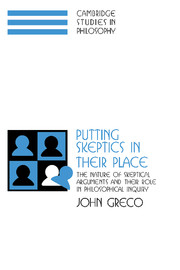 Putting Skeptics in their Place
Putting Skeptics in their Place Book contents
- Frontmatter
- Contents
- Preface
- 1 The Nature of Skeptical Arguments and Their Role in Philosophical Inquiry
- 2 Skepticism about the World: Part One – Reconstructions
- 3 Skepticism about the World: Part Two – Dismissive Responses
- 4 Skepticism about the World: Part Three – Dualism, Realism, and Representationalism
- 5 The Argument from an Infinite Regress of Reasons
- 6 Hume's Skepticism about Unobserved Matters of Fact
- 7 Agent Reliabilism
- 8 Agent Reliabilism and the Relevant Sense of “Relevant Possibility”
- 9 Moral and Religious Epistemology
- Bibliography
- Index
4 - Skepticism about the World: Part Three – Dualism, Realism, and Representationalism
Published online by Cambridge University Press: 03 November 2009
- Frontmatter
- Contents
- Preface
- 1 The Nature of Skeptical Arguments and Their Role in Philosophical Inquiry
- 2 Skepticism about the World: Part One – Reconstructions
- 3 Skepticism about the World: Part Two – Dismissive Responses
- 4 Skepticism about the World: Part Three – Dualism, Realism, and Representationalism
- 5 The Argument from an Infinite Regress of Reasons
- 6 Hume's Skepticism about Unobserved Matters of Fact
- 7 Agent Reliabilism
- 8 Agent Reliabilism and the Relevant Sense of “Relevant Possibility”
- 9 Moral and Religious Epistemology
- Bibliography
- Index
Summary
At present, Western philosophy is divided among various schools. For reasons that are partly philosophical and partly historical, philosophy as it is practiced in the Anglo-American or “analytic” tradition often looks very different from what goes on in traditional continental philosophy, the tradition of American pragmatism, or the so-called post-modern school. But across these various factions one discovers a point on which there is odd agreement. A great many philosophers, including representatives from each of the schools mentioned, have defended essentially the same diagnosis of skepticism about the world. Namely, they claim that skepticism is not an epistemological problem at all, but is rather the necessary consequence of a misguided modern ontology. Once that ontology is given up, these philosophers agree, the problem of skepticism cannot even get off the ground.
Richard Rorty calls this characterization of the relationship between skepticism and the modern ontology “the usual story,” citing Etienne Gilson and J. H. Randall as two of the story's prominent proponents. Here are some characteristic statements of the position, beginning with two from a founding father of Anglo-American philosophy, George Berkeley:
[W]e have been led into very dangerous errors, by supposing a two-fold existence of the objects of sense – the one intelligible or in the mind; the other real and without the mind, whereby unthinking things are thought to have a natural subsistence of their own, distinct from being perceived by spirits. This, which, if I mistake not, hath been shown to be the most groundless and absurd notion, is the very root of Scepticism.
(A Treatise concerning the Principles of Human Knowledge, pp. 107-108)- Type
- Chapter
- Information
- Putting Skeptics in their PlaceThe Nature of Skeptical Arguments and their Role in Philosophical Inquiry, pp. 77 - 107Publisher: Cambridge University PressPrint publication year: 2000


